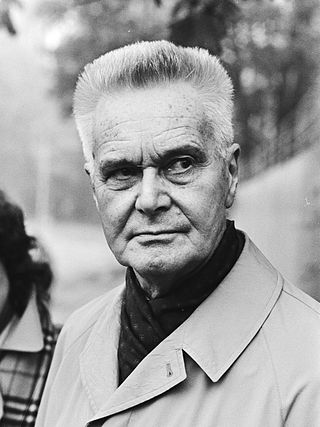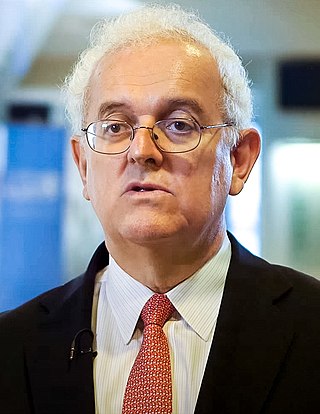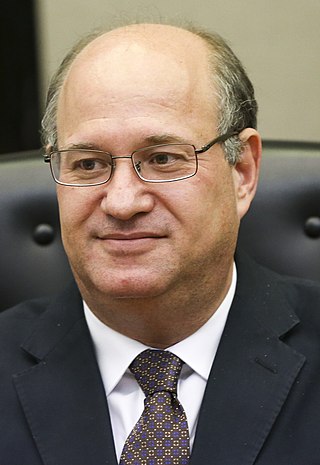
Jan Tinbergen was a Dutch economist who was awarded the first Nobel Memorial Prize in Economic Sciences in 1969, which he shared with Ragnar Frisch for having developed and applied dynamic models for the analysis of economic processes. He is widely considered to be one of the most influential economists of the 20th century and one of the founding fathers of econometrics.

Armínio Fraga Neto is a Brazilian economist who was president of the Central Bank of Brazil from 1999 to 2003. From 1993 until his appointment to the Central Bank, he was Managing Director of Soros Fund Management in New York. Since 2001, he has been a member of the influential Washington-based financial advisory body, the Group of Thirty.

Gustavo Henrique de Barroso Franco is a Brazilian economist. Former Governor of the Brazilian Central Bank, is best known for being one of the "fathers" of the Real Plan, the 1994 monetary reform that ended hyperinflation in Brazil. He teaches economics at the Catholic University in Rio de Janeiro since 1986. He is also a businessman, consultant and has served on many boards. He founded Rio Bravo Investimentos where he works as Senior Advisor. He has written several books, academic papers and contributes regularly to newspapers and magazines.

Mahmoud Mohieldin, is an economist with more than 30 years of experience in international finance and development. He is the UN Climate Change High-Level Champion for Egypt. He is an Executive Director at the International Monetary Fund. He has been the United Nations Special Envoy on Financing the 2030 Sustainable Development Agenda since February 2020. He was the Minister of Investment of Egypt from 2004-2010, and most recently, served as the World Bank Group Senior Vice President for the 2030 Development Agenda, United Nations Relations and Partnerships. His roles at the World Bank also included Managing Director, responsible for Human Development, Sustainable Development, Poverty Reduction and Economic Management, Finance and Private Sector Development, and the World Bank Institute; World Bank President's Special Envoy on the Millennium Development Goals (MDGs), the Post-2015 Development Agenda, and Financing for Development; and Corporate Secretary and Executive Secretary to the Development Committee of the World Bank Group's Board of Governors. Dr Mohieldin also served on several Boards of Directors in the Central Bank of Egypt and the corporate sector. He was a member of the Commission on Growth and Development and was selected for the Young Global Leader of the World Economic Forum in 2005. His professional experience extends into the academic arena as a Professor of Economics and Finance at the Faculty of Economics and Political Science, Cairo University and as a visiting professor at several renowned Universities in Egypt, Korea, the UAE, the UK and the USA. He is a member of the International Advisory Board of Durham University Business School. He also holds leading positions in national, regional and international research centres and associations. He has authored numerous publications and articles in leading journals in the fields of economics, finance and development.
Ibmec is a private research university with five campuses in Brazil's main cities of Rio de Janeiro, São Paulo, Belo Horizonte, and Brasília. Founded in 1970, it is one of Latin America's most prestigious business and economics school and today offers undergraduate and graduate programs in several other disciplines.

The Kiel Institute for the World Economy is an independent, non-profit economic research institute and think tank based in Kiel, Germany. In 2017, it was ranked as one of the top 50 most influential think tanks in the world and was also ranked in the top 15 in the world for economic policy specifically. German business newspaper, Handelsblatt, referred to the institute as "Germany's most influential economic think tank", while Die Welt, stated that "The best economists in the world are in Kiel".
André Medici is a Brazilian health economist with a background in health strategy, public and private health financing in Latin America and the Caribbean, social security and pensions, economic reform, gender health issues, environmental protection, and globalization. He is currently a Senior Health Specialist at the Inter-American Development Bank, in Washington, DC.
Werner Baer was an American economist at the University of Illinois Urbana-Champaign and the Jorge Lemann Professor of Economics. He received his bachelor's degree from CUNY Queens College in 1953, and a Master's and a Ph.D. from Harvard University in 1955 and 1958 respectively. His research centered on Latin America's industrialization and economic development, especially of Import Substitution Industrialization (ISI) and Brazil.
The Deutsche Bank Prize in Financial Economics honors renowned researchers who have made influential contributions to the fields of finance and money and macroeconomics, and whose work has led to practical and policy-relevant results. It was awarded biannually from 2005 to 2015 by the Center for Financial Studies (CFS), in partnership with Goethe University Frankfurt, and is sponsored by Deutsche Bank Donation Fund. The award carried an endowment of €50,000, which was donated by the Stiftungsfonds Deutsche Bank im Stifterverband für die Deutsche Wissenschaft.

José Antonio Ocampo Gaviria is a Colombian writer, economist and academic who was the professor of professional practice in international and public affairs and director of the Economic and Political Development Concentration at the School of International and Public Affairs at Columbia University from July 2007 to August 2022. Prior to his appointment, Ocampo served in a number of positions in the United Nations and the Government of Colombia, most notably in the United Nations as Under-Secretary-General for Economic and Social Affairs and Executive Secretary for the Economic Commission for Latin America and the Caribbean, and in Colombia as Minister of Finance and Public Credit and Minister of Agriculture and Rural Development.

Fundação Getulio Vargas is a Brazilian higher education institution and think tank founded on December 20, 1944.

The Encilhamento was an economic bubble that boomed in the late 1880s and early 1890s in Brazil, bursting during the early years of the First Brazilian Republic (1889–1894) and leading to an institutional and a financial crisis. Two Finance Ministers, first the Viscount of Ouro Preto and then Ruy Barbosa, adopted a policy of unrestricted credit for industrial investments, backed by an abundant issuance of money, in order to encourage Brazil's industrialization. This policy of economic incentives created unbridled speculation and increased inflation, and encouraged fraudulent initial public offerings (IPOs) and takeovers.

Joaquim Vieira Ferreira Levy is a Brazilian economist and Brazil's former Finance Minister. Levy took office on January 1, 2015, during the presidential inauguration of Dilma Rousseff's second term. He also was president of the Brazilian Development Bank (BNDES).
Carlos Hamilton Vasconcelos Araújo is graduated in civil engineering and holds an M.Sc. and a Ph.D. in economics. Previously, he was a member of the Risks and Capital Committee (2018/2019) and Chief of Services, Infrastructure and Operations Officer (2016–2018), both in Banco do Brasil. Since 2019, he is a member of the Board of Directos of Banco Votorantim, BB-BI, BB DTVM, BB Mapfre SH1, BB Elo Cartões, BB Cartões and BB Leasing.

Nelson Henrique Barbosa Filho is a Brazilian economist and professor of economics. From 21 December 2015 to 12 May 2016, he was Brazil's Minister of Finance.
The COPPEAD Graduate School of Business – Federal University of Rio de Janeiro, also known as COPPEAD, is a business school founded in 1973 in Rio de Janeiro, Brazil.

Maria da Conceição Tavares was a Portuguese naturalized Brazilian economist. She was a full professor at the State University of Campinas (Unicamp) and professor emeritus of the Federal University of Rio de Janeiro (UFRJ). Her students included the former president of Brazil, Dilma Rousseff. Tavares was affiliated with the Workers' Party, and she was a Federal Deputy representing the state of Rio de Janeiro between 1995 and 1999. Left-wing focused, she was the author of several books on Brazil's economic development as well as numerous journal articles.

Luiz Carlos Bresser-Pereira is a Brazilian economist and social scientist. He teaches at the Getulio Vargas Foundation in São Paulo. Since 1981, he has been the editor of the Brazilian Journal of Political Economy.

Ilan Goldfajn is a Brazilian economist, former governor of the Central Bank of Brazil and former director of the International Monetary Fund's Western Hemisphere Department. In December 2022, he became president of the Inter-American Development Bank.

Paulo Roberto Nunes Guedes is a Brazilian economist and co-founder of the investment bank BTG Pactual. He is also a co-founder of the think-tank Instituto Millenium, and was the economic advisor for the campaign of President Jair Bolsonaro. Guedes served as the Minister of the Economy of Brazil through the entirety of the Bolsonaro presidency, from 1 January 2019 to 1 January 2023.














